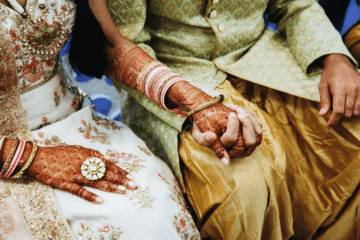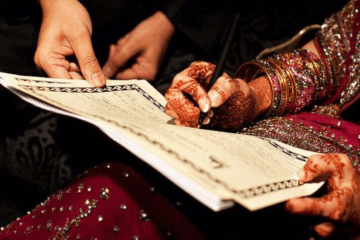
Nikah: The Islamic Marriage Contract
This article is written by Aditya Kumar Singh (Definition of Nikah and its objective, nature of nikah, Essentials for its validity), Army Law College, Pune
Abstract
Nikah is a term used in the Islamic faith to describe the marriage contract between a man and a woman. This union is considered a sacred and lifelong commitment based on mutual love, respect, and understanding.
The Nikah ceremony is an important part of Islamic culture and includes various rituals and customs. These may include reciting verses from the Quran, exchanging rings, and signing the marriage contract. The ceremony typically takes place in the presence of witnesses, including family and friends. Consent is a crucial aspect of Nikah, and both parties must agree to the marriage willingly. Forced marriages are not permitted in Islamic law. The rights and responsibilities of the bride and groom are also an important consideration in the Nikah process.
The role of the family and community is also significant in Nikah. It is often seen as a celebration for the families involved, and the community may offer support and guidance throughout the process. Nikah is a sacred union in the Islamic faith that involves various customs and rituals. Consent, the rights and responsibilities of both parties, and the role of the family and community are all important considerations in this process.
Introduction
Nikah is a term used in Islamic culture to refer to marriage or the contract of marriage. It is a legal agreement between two consenting individuals who agree to live together as husband and wife in accordance with the teachings of Islam.
The history of nikah dates back to the time of Prophet Muhammad, who is considered the last prophet in Islam. The practice of nikah was established during his lifetime and has been an important part of Islamic culture ever since. In Islamic tradition, marriage is considered to be a sacred bond between two individuals and is an essential aspect of a Muslim’s life. The purpose of marriage is to establish a strong and stable family unit and to fulfill one’s duties and responsibilities as a Muslim.
Understanding Nikah: A Comprehensive Guide
The process of nikah involves a proposal and acceptance between the two parties, followed by the signing of a marriage contract. The contract outlines the rights and responsibilities of both parties, including financial obligations, and is signed in the presence of witnesses. Nikah is also considered to be a social contract between two families, as it brings together two different families and creates a new bond between them. The ceremony is often accompanied by a variety of cultural and religious rituals and celebrations, depending on the local customs of the area.
Nikah plays a vital role in the Islamic faith as it is considered a means of strengthening and preserving the family unit, which is the foundation of society. It is a religiously recognized union that is designed to provide a stable and supportive environment for the couple to fulfill their roles as spouses, parents, and members of the community.
The process of Nikah involves several steps, including finding a suitable partner, obtaining the consent of both parties, and completing the contract. Islamic law requires the presence of witnesses during the Nikah ceremony, and specific phrases must be recited by the bride and groom in the presence of an Islamic authority to ensure the marriage is legally binding.
In addition to the requirements for the Nikah to be valid, Islamic law emphasizes the importance of mutual understanding and respect between the bride and groom. Both parties must agree to the terms of the contract and the expectations of the marriage. The groom is required to provide a dowry to the bride, which is seen as a gesture of commitment and support for the wife.
Once the couple is married, they are expected to work together to maintain a healthy and loving relationship. They are required to fulfill their roles and responsibilities as spouses, parents, and members of the community. Islamic law also provides guidelines for divorce, which can be initiated by either the husband or wife if the marriage is no longer sustainable.
It is important to note that while Nikah is a religiously recognized union in Islam, it is not limited to Muslims only. Non-Muslims can also enter into a Nikah contract, but the terms and conditions of the contract must comply with Islamic law.
Nikah is viewed as a means of fulfilling one’s religious obligations in Islam. The Prophet Muhammad (peace be upon him) said, “Marriage is my Sunnah (tradition), whoever disregards my tradition is not from me.” Therefore, Nikah is not only a means of fulfilling one’s emotional and physical needs but also a means of fulfilling one’s religious duties.
Nikah is viewed as a means of protecting the couple’s rights and the rights of their offspring. Islamic law provides guidelines for the division of assets, inheritance, and child custody in the event of divorce or the death of one or both spouses. This ensures that the rights of all parties involved are protected and preserved.
Nikah is the Islamic term for marriage, which is a legally binding contract between a man and a woman. The term Nikah is derived from the Arabic word “Nakaha,” which means to join or to unite. In Islamic law, Nikah is considered to be one of the most important and sacred institutions of society.
The purpose of Nikah is to create a permanent relationship between a man and a woman based on mutual love, respect, and companionship. This relationship is governed by Islamic principles and is intended to provide a stable and supportive environment for the couple to fulfill their roles as spouses, parents, and members of the community.
The process of Nikah involves several steps, including finding a suitable partner, obtaining the consent of both parties, and completing the contract. In Islam, the consent of both parties is essential for a marriage to be valid. The bride and groom must agree to the terms of the contract and the expectations of the marriage.
The contract itself is a formal agreement between the two parties, which includes the terms of the marriage such as the financial obligations of each party, the rights and responsibilities of the husband and wife, and the conditions for divorce. The contract can be as simple or as detailed as the couple wishes, but it must be agreed upon by both parties.
In addition to the contract, there are several other requirements for a Nikah to be valid in Islamic law. These include the presence of witnesses, the payment of a dowry to the bride, and the recitation of specific phrases by the bride and groom in the presence of an Islamic authority.
Once the contract has been completed and the requirements have been met, the couple is considered married in the eyes of Islamic law. The marriage is intended to be a lifelong commitment, and the couple is expected to work together to maintain a loving and supportive relationship.
In conclusion, Nikah is the Islamic term for marriage, which is a legally binding contract between a man and a woman. The purpose of Nikah is to create a permanent relationship based on mutual love, respect, and companionship. The process of Nikah involves several steps, including finding a suitable partner, obtaining the consent of both parties, and completing the contract. The contract includes the terms of the marriage, and there are several other requirements for a Nikah to be valid in Islamic law. Once the requirements have been met, the couple is considered married in the eyes of Islamic law, and the marriage is intended to be a lifelong commitment.
Nature of Nikah
Nikah is a term used in Islam to refer to the marriage contract between a Muslim man and woman. It is a sacred and legally binding agreement that establishes the rights and responsibilities of both parties in the relationship.
In Islam, marriage is considered to be a highly valued and important institution, and the nikah ceremony is a significant and joyous occasion for the couple and their families. The contract typically involves the payment of a dowry or mahr by the groom to the bride, and the couple’s acceptance of each other as partners in marriage.
The nikah is more than just a social or cultural practice, as it has religious significance and is considered to be an act of worship in Islam. It is believed to be a means of strengthening the family unit and promoting harmony and love between spouses.
It is important to note that the nikah ceremony may vary in terms of cultural and regional practices, but the fundamental elements of the contract remain the same.
In addition to establishing the rights and responsibilities of the couple, the nikah contract also outlines the terms of the marriage, such as the length of the marriage, the rights of the wife, and the obligations of the husband.
The marriage contract is witnessed by two adult Muslim witnesses and is usually conducted by an Islamic cleric or an authorized representative of the couple. The ceremony can take place in a mosque, a home, or any other location deemed appropriate by the couple.
Marriage in Islam is viewed as a partnership based on mutual love, respect, and trust, and the nikah ceremony is a formal recognition of this partnership. It is not just a contract between two individuals, but also a contract between the couple and Allah.
It is worth noting that Islam places great emphasis on the importance of consent in marriage, and the nikah can only take place with the free and willing consent of both parties. Any form of coercion or force is strictly prohibited in Islam.
Objectives of nikah
The objectives of nikah in Islam are multi-faceted and can be broadly categorized into spiritual, social, and personal aspects. Some of the key objectives of nikah are:
- Establishing a spiritual bond: Nikah is considered to be a sacred and religious act in Islam, and it helps to establish a spiritual bond between the couple. The marriage contract is a way of seeking the blessings and guidance of Allah for a happy and successful married life
- Promoting family values: Marriage is viewed as a means of strengthening the family unit in Islam, and the nikah ceremony is an opportunity to bring together two families and create a strong bond between them.
- Protecting the rights of women: The nikah contract establishes the rights and responsibilities of both partners, and ensures that women are given their due rights and treated with respect and dignity within the marriage.
- Fostering social stability: Marriage is seen as a means of fostering social stability in Islam, as it provides a stable environment for the upbringing of children and promotes the values of love, compassion, and mutual understanding.
- Encouraging personal growth: Nikah encourages personal growth and development for both partners, as it requires them to work together to build a successful and happy marriage.
- Providing companionship: Marriage is viewed as a means of providing companionship and emotional support for both partners. The nikah ceremony formalizes this relationship and provides a framework for the couple to build a strong and lasting bond.
- Strengthening the community: Marriage is an important part of the social fabric of Islamic communities, and the nikah ceremony helps to strengthen these bonds and promote unity within the community.
- Procreation: Marriage is seen as a means of fulfilling the natural human desire for procreation and ensuring the continuity of the human race.
- Upholding moral values: Nikah promotes the values of honesty, loyalty, and fidelity within the marriage, and encourages the couple to maintain high moral standards in their personal and social lives.
- Fulfilling a religious duty: Marriage is viewed as a religious duty in Islam, and the nikah ceremony is a means of fulfilling this obligation and seeking the blessings of Allah for a successful and happy married life.
Overall, the objectives of nikah in Islam are far-reaching and encompass both spiritual and practical aspects of married life. The ceremony is an important part of Islamic culture and serves to promote the values of love, respect, and mutual understanding within the community.
Essential for validity of nikah
A nikah, which is an Islamic marriage contract, is considered valid if it meets the following essential requirements:
- Consent: Both the bride and groom must freely give their consent to the marriage without any coercion, duress, or pressure from others.
- Capacity: Both the bride and groom must be mentally and physically capable of understanding the nature and consequences of the marriage contract.
- Presence of witnesses: The nikah must be witnessed by at least two Muslim witnesses who are of sound mind and have reached the age of puberty.
- Mahr: A mahr, which is a mandatory gift from the groom to the bride, must be specified in the nikah contract.
- Wali: The bride must have a wali (guardian) who gives her away in marriage.
- Intention: Both the bride and groom must have the intention of entering into a permanent and exclusive marital relationship.
- Prohibited relationships: A nikah is not valid if the bride and groom are closely related to each other, such as siblings, parent and child, or grandparents and grandchildren.
- Observance of Islamic laws: The nikah must be conducted in accordance with Islamic laws and customs, including the recitation of certain phrases and the presence of an officiant who is authorized to conduct the marriage.
- Absence of legal impediments: The bride and groom must not be currently married to anyone else or be in a state of ihram (pilgrim sanctity).
Another important aspect of the validity of a nikah is the presence of a marriage contract. The contract should include the essential requirements I mentioned earlier, as well as any other additional terms or conditions that the bride and groom may agree upon. The contract should be written, signed, and witnessed by the parties involved, as well as their respective walis and witnesses.
In some cases, a nikah may also require the permission of the bride’s wali or guardian. This is especially important if the bride is a virgin, as her wali’s permission is required in order for the marriage to be valid.
It is also important to ensure that both the bride and groom are aware of their rights and responsibilities under Islamic law with regard to marriage. This includes the requirement for the husband to provide for his wife financially, the obligation for both parties to treat each other with kindness and respect, and the right of the wife to seek divorce under certain circumstances.
Overall, the validity of a nikah is dependent on a number of factors, including the fulfillment of essential requirements, compliance with Islamic laws and customs, and the absence of any factors that may render the marriage contract invalid or unenforceable.
Conclusion
In conclusion, the nikah is an essential component of Islamic marriage that requires the fulfillment of certain criteria, such as consent, capacity, the presence of witnesses, mahr, and wali. Plagiarism, which is the act of using someone else’s work without proper attribution, is not relevant to the validity of a nikah. It is important to conduct the nikah in a manner that is consistent with Islamic teachings and principles, and to ensure that both parties are aware of their rights and responsibilities under Islamic law with regard to marriage. By following these guidelines, couples can enter into a valid and meaningful nikah that reflects the sanctity and importance of marriage in Islam.
The nikah is a significant event in the life of a Muslim, as it signifies the commitment of two individuals to build a life together based on love, respect, and shared values. It is important to note that while the nikah is a religious ceremony, it also has legal implications, as it establishes the rights and responsibilities of both parties under Islamic law.
In addition to the essential requirements for a valid nikah, it is also important to ensure that the nikah is conducted in a respectful and dignified manner. This includes treating both the bride and groom with kindness and compassion, and ensuring that the ceremony is free from any forms of coercion or exploitation.
It is important to recognize that the nikah is not just a one-time event, but rather a lifelong commitment to building a strong and loving relationship based on mutual respect and understanding. Couples should work together to nurture their relationship over time, seeking guidance and support from trusted family members, friends, and religious leaders as needed.
In summary, the nikah is an important aspect of Islamic marriage that requires careful planning, preparation, and adherence to Islamic laws and customs. By following these guidelines and working together to build a strong and loving relationship, couples can establish a firm foundation for a happy and fulfilling life together.
REFERENCES




0 Comments